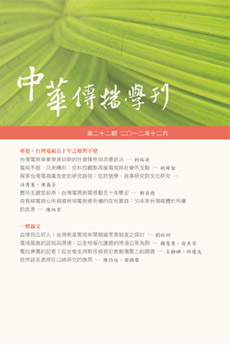 閱覽人數: 29
閱覽人數: 29
December
2012
No. 22
台灣電視五十年之變與不變
To Be or Not to Be: Taiwan TV’s 50th Anniversary頁數:45 - 65
作者(中)
孫秀蕙、陳儀芬
作者(英)
Hsiu-Hui Sun,I-Fen Chen
關鍵詞(中)
文化研究 ; 敘事學 ; 符號學 ; 電視廣告 ; 廣告史
關鍵詞(英)
cultural studies ; narratology ; semiotics ; television commercials(TVC) ; advertising history
中文摘要
台灣電視開台迄今已有五十年。電視廣告研究不但有助於我們理解廣告與流行文化、台灣社會變遷之間的關係,更可以協助傳播領域開闢一個以廣告史為主軸的學術對話空間。本文以回顧台灣廣告影片發展、電視廣告史研究文獻為起點,然後以符號研究的觀點辨識電視廣告文本的特性、符號組成基本單位,接下來運用Tomashevsky提出的敘事工具箱概念來分析電視廣告的情節結構與功能,最後以互涉文本的概念說明電視廣告的敘事手法如何反映台灣戰後歷史進程中,三個重要的文化面向,並提出未來值得關注的廣告符號研究課題。
英文摘要
It has been fifty years since the first television station, TTV, was established in Taiwan. Studies of TV commercials help us not only to understand the relationships among advertisements, popular culture and social changes in Taiwan, but also to create an academic dialogue around the axis of advertising history. The present study begins with reviewing the development of Taiwan's TV commercials and advertising history literature, and then it adopts principles of semiotics to recognize the textual features and the analytical units of TV commercials. We suggest that the analytical toolbox proposed by Tomashevsky should be suitable for the research of episodic structures and persuasive functions of TV commercials. Based on the results of our analysis, we may further discuss the process in which the narrating strategies of TV commercials reflect three significant dimensions in Taiwan's post-war culture, and finally provide suggestions for future semiotic studies of TV commercials.